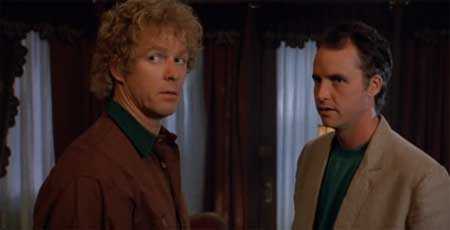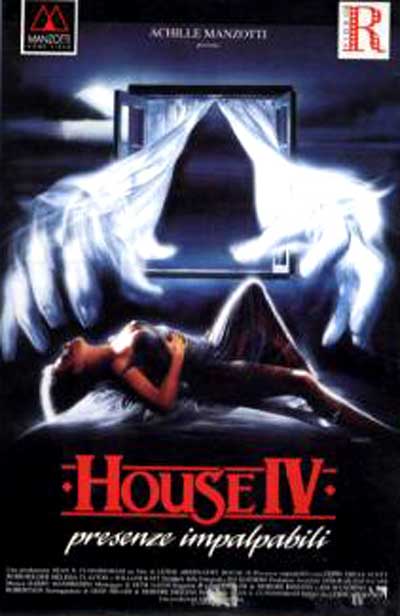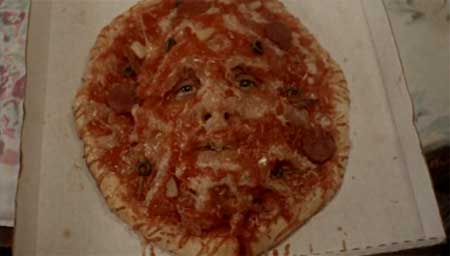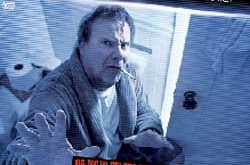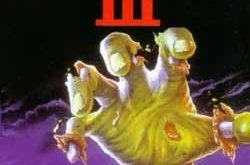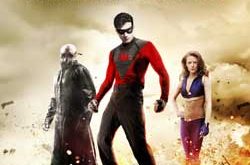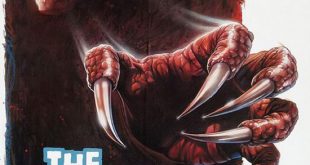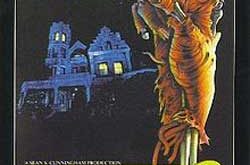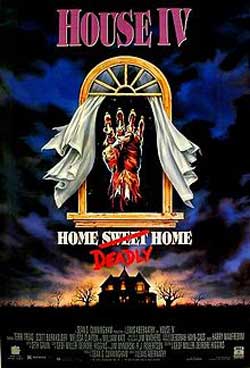
SYNOPSIS:
Roger Cobb (William Katt) is killed in a car accident. His family must move into the house that has haunted him for several years. Soon the family begins to experience scary and unexplained phenomena.
REVIEW:
The majority of the crew behind House IV was involved in the original House and its sequel, House II: The Second Story, but this film doesn’t incorporate the same tone that the originals managed to capture. Producer Sean S. Cunningham and musician Harry Manfredini are the common denominators from those other films, and while the setting and music of House IV feels very similar to its predecessors, the actual plot and execution of the film never manages to capture the mix of horror and comedy that made House such a delight.
William Katt, who played Roger Cobb in the first two films, reprises his role as Roger Cobb in House IV, although the two storylines are not interconnected and the film never attempts to make a parallel between the Cobb of the first film and the Cobb of this one. As it stands, Katt is one of the best parts of the House franchise; his curly hair, facial expressions, and overall good-natured attitude make him a compelling protagonist. Unfortunately, he’s only present in House IV for the first ten minutes before he’s abruptly (and surprisingly) killed off during a car accident. Once we lose Roger, things in the House universe begin to get a little foggy.
As expected, Roger’s wife and child are left wondering what to do with their lives, and as a tribute to Roger, they move into the house that his family lineage has cherished for generations. Along with the move, though, are a lot of scenes of Roger’s wife Kelly (Terri Treas) mourning his passing, flashing back to the moments when she feels responsible for his death. A solid moment of grieving is important for realism, but once House IV continues to harp on the same themes of loss, death, and guilt, the mourning gets a little tiresome.
Still, though, Kelly and her daughter Laurel (Melissa Clayton) are a likable duo, and their relationship is strengthened by numerous scenes of bonding between the two. The house sort of gets in the way, especially when it’s trying to spook Kelly into possibly killing Laurel or feeding her a pizza with a man’s face in it, but they do the best they can despite it.
But even with the strong characters, House IV doesn’t really make a whole lot of sense when it comes to actual plot. The idea behind House was that houses harbor secrets, and at times the house might use it against you, might even react against you if you do something it doesn’t like. The house of House IV, then, doesn’t really know what to do with itself.
The writers attempt to make the drafty house into something haunted, where physical manifestations and hallucinations plague the characters living there. But the reason why the house reacts doesn’t really make sense; there’s something about an old Indian seal within the basement of the house, and a blood oath never to sell the place passed down through Roger’s family, and even a weird Indian shaman named Ezra who probably feels pretty foolish performing all of the on-screen hoodoo within the house. But other than the fact that the house wants to stay unsold and standing rather than torn down to make a toxic waste dump, the reason for the hauntings visited on the two Cobbs is quite lacking.
The other thing about these hauntings is that they’re very few and far between. House IV is a slow film, one that dwells on human relationships rather than the monsters of the house. That would be admirable if the film wasn’t so muddled on how it wanted to be perceived. At times, the film takes on the same comedic tone as the original, with talking pizzas and bad guys hallucinating about bugs and snakes and then shooting each other. But then again, House IV also wants to be taken seriously, inviting the viewer to feel the grief of Kelly as she visits Roger on the other side. The film never chooses which side it wants to stick with, and so there’s a lot of confusion about what the film actually wants the audience to feel.
The major problem with House IV is this hypocritical concept of the house. Since the house both attacks and protects Kelly and Laurel, the themes of the film get mixed up into a mess of ideas about houses and protection of property and Indian curses, none of which really make sense when the film boils down. House IV is ultimately a disappointing conclusion to a series of successful horror comedies, a destitute house that should be condemned rather than displayed for open house.
House IV (1992)
 Horror News | HNN Official Site | Horror Movies,Trailers, Reviews
Horror News | HNN Official Site | Horror Movies,Trailers, Reviews
